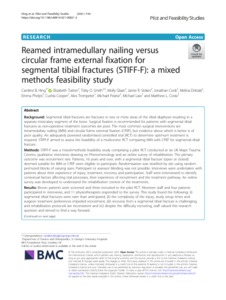Pernaute-Lau, L; Adegnika, AA; Zhou, Y; Zinsou, JF; Gil, JP; Krishna, S; Kremsner, PG; Lauschke, VM; Velavan, TP
(2021)
Pharmacogene sequencing of a Gabonese population with severe Plasmodium falciparum malaria reveals multiple novel variants with putative relevance for antimalarial treatment.
Antimicrob Agents Chemother, 65 (7).
ISSN 1098-6596
https://doi.org/10.1128/AAC.00275-21
SGUL Authors: Krishna, Sanjeev
![[img]](https://openaccess.sgul.ac.uk/113214/1.hassmallThumbnailVersion/s40814-021-00821-3.pdf)  Preview |
|
PDF
Accepted Version
Available under License ["licenses_description_publisher" not defined].
Download (1MB)
| Preview
|
Abstract
Malaria remains one of the most deadly diseases in Africa, particularly for children. While successful in reducing morbidity and mortality, antimalarial treatments are also a major cause of adverse drug reactions (ADRs). Host genetic variation in genes involved in drug disposition or toxicity constitutes an important determinant of ADR risk and can prime for parasite drug resistance. Importantly however, the genetic diversity in Africa is substantial and thus genetic profiles in one population cannot be reliably extrapolated to other ethnogeographic groups. Gabon is considered a high-transmission country with more than 460,000 malaria cases per year. Yet, the pharmacogenetic landscape of the Gabonese population or its neighboring countries has not been analyzed. Using targeted sequencing, we here profiled 21 pharmacogenes with importance for antimalarial treatment in 48 Gabonese pediatric patients with severe Plasmodium falciparum malaria. Overall, we identified 347 genetic variants of which 18 were novel and each individual was found to carry 87.3±9.2 SD variants across all analyzed genes. Importantly, 16.7% of these variants were population-specific, highlighting the need for high-resolution pharmacogenomic profiling. Between one in three and one in six individuals harbored reduced activity alleles of CYP2A6, CYP2B6, CYP2D6 and CYP2C8 with important implications for artemisinin, chloroquine and amodiaquine therapy. Furthermore, one in three patients harbored at least one G6PD deficient allele, suggesting considerably increased risk of hemolytic anemia upon exposure to aminoquinolines. Combined, our results reveal the unique genetic landscape of the Gabonese population and pinpoint the genetic basis for inter-individual differences in antimalarial drug response and toxicity.
Statistics
Item downloaded times since 05 May 2021.
Actions (login required)
 |
Edit Item |



